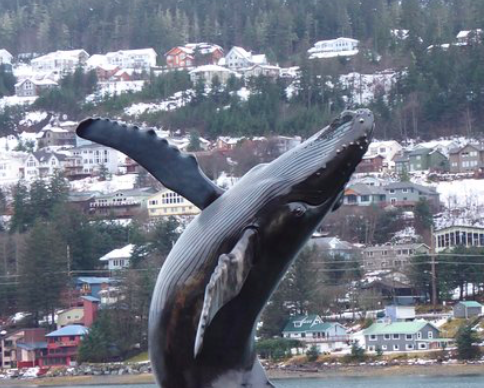NO MORE BRONZE WHALES
A lawsuit that Cruise Lines International Association of Alaska filed against the City and Borough of Juneau has been settled. The city will not appeal the decision that went against it in December, when U.S. District Court Judge H. Russel Holland agreed that the head tax being collected was not being spent in accordance with the U.S. Constitution’s Tonnage Clause.
That clause prohibits states from taxing cargo without the consent of Congress if they aren’t providing some kind of service to the ship itself. At issue was a long sea walk and an artificial island adjacent to a bronze whale that was far away from the actual operations of the ships and the docks that support the industry.
The agreement between the parties is scheduled to be adopted at a special Assembly meeting on Friday, March 22, at 5 p.m.

“This agreement is a great solution for CLIA, CBJ, cruise ship passengers, and all Alaskan port communities. I’m so happy to move beyond litigation and get back to the collaborative work of growing and supporting our economic development. This agreement solves the underlying tension between Juneau’s need to exercise local control and CLIA’s need to have predictable applications of the law and implementations of fee and tax policy that don’t create unintended consequences. My only regret is that the parties didn’t find this practical solution sooner,” said City Manager Rorie Watt.
The meat of the agreement is:
- Juneau will use passenger fees to continue providing services and infrastructure to cruise ships including: restrooms, signage/wayfinding, motor coach staging, crossing guards, fire and emergency medical service, and police patrols. There would be no change from historical practice in the port area.
- Juneau will use passenger fees to fund up to 75 percent ($9.3 million) of the $12.4 million Statter Harbor project. The remainder of the project costs will come from local sources.
- Legal fees for both parties will be reimbursed.
- Juneau will continue to develop the downtown waterfront in accordance with the Long Range Waterfront Plan.
- Passenger fees will not increase for the next three years.
Both parties also agreed to meet annually to discuss any new proposed Juneau projects and services that may be funded with passenger fees. Moving forward, Juneau and the cruise industry will agree to settle future disagreements through discussion or mediation before resorting to litigation.
CLIA filed a lawsuit in the spring of 2016 alleging CBJ was unconstitutionally collecting and spending fees collected from cruise ship passengers.
“Litigation was hard on everyone, but we all suffered enough to fully appreciate the value of a strong working relationship. I especially applaud CLIA’s willingness to step up, acknowledge community impacts, and be a partner in the provision of necessary services and infrastructure,” Watt said.
“We are very pleased to reach a resolution with the CBJ and certainly appreciate the mayor, assembly and city manager’s considerable efforts toward, what is a very positive outcome,” said John Binkley, the president of CLIA-Alaska. “The agreement achieves our goal of providing certainty and predictability of how passenger fees will be utilized going forward; while still supporting services to our guests and the local community.”
